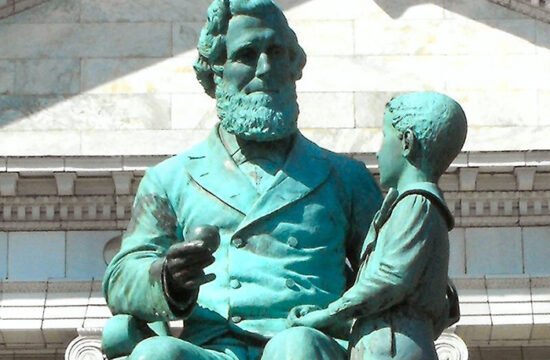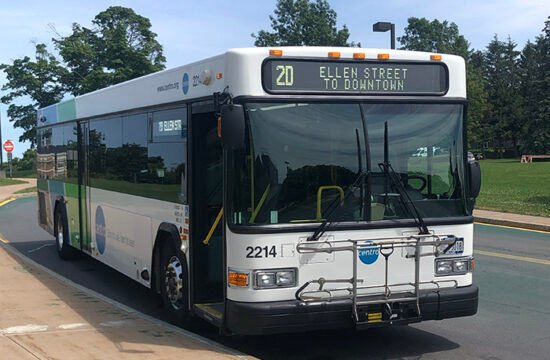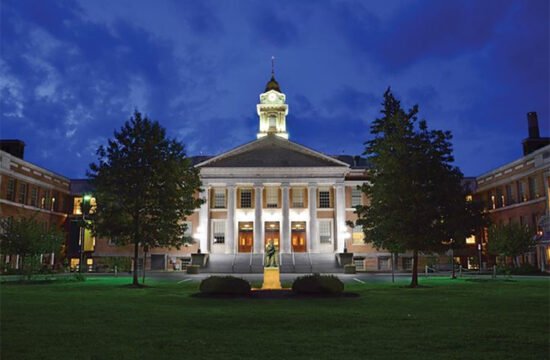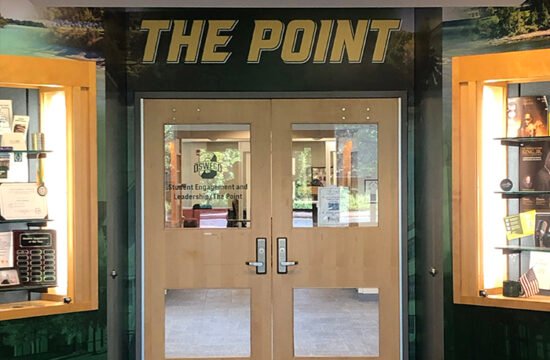By Tom and Jerry Caraccioli
Sustainability is a buzzword we hear a lot these days. But what does it actually mean?
“The term sustainability is pretty broad,” SUNY Oswego Director of Sustainability Kate Spector said. “I like to use the ‘people, prophet, planet’ moniker in describing our goals. Our office really focuses primarily on the environmental pieces of that. We focus on what we can do to drive down the total amount of waste that’s landfilled or incinerated as a result of campus activities. We do a lot of grounds work — installing new pollinator beds on campus, maintaining our arboretum, working towards our ‘Tree Campus USA’ obligations and really focusing on the environmental pieces of sustainability.”
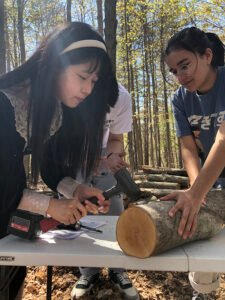
At SUNY Oswego, the acknowledgement of the need for progressive thinking when it comes to the Earth led to the Office of Sustainability incorporate a commitment to improving the environment and creating awareness of the best strategies for ecological stewardship.
Oswego’s commitment runs deep as an institution intimately ingrained in the Lake Ontario and Central New York ecosystem. The college’s Sustainability Office caters to and promotes its goals through various resources including “waste,” “community” and “land” initiatives. These initiatives not only teach lessons in sustainability but also business by stressing the idea of a circular economy of goods at SUNY Oswego.
“It all goes back to our 2007 commitment to carbon neutrality,” Spector said. “Our former president, Deborah Stanley, signed that in 2007 and it really got the ball rolling in terms of SUNY Oswego recognizing that climate change was happening. That signature event created some pretty ambitious goals in terms of making sure we were ahead of the curve and doing what we needed to do to aggressively minimize our greenhouse gas emissions.”
The “waste” initiative offers programs like Shining Waters, a program popular with Oswego’s athletes, as well as fraternities and sororities, in which they collect garbage once a week throughout the campus. Another program is Oz Compost in which surplus food deemed safe for donation from the residential and dining facilities – 7,500 pounds annually – is shared with food pantries on and off campus.
The compost program also works with Bristol Hill Composting Facility to help turn nearly 100,000 pounds of inedible food into nutrient-rich organic soil. Oz Thrift offers an end-of-semester drive to collect excess clothing, electronics and other potential landfill items which results in nearly 30,000 pounds of waste being diverted from landfills.
The “community” initiative provides students with opportunities to engage and promote in BikeShare, SeedShare, Open Garden Hours and climate activism, while the “land” initiative focuses on forest management, Maple on Tap and growing mushrooms in the mushroom yard.
“During any given semester we have between six and 10 student interns working closely within the operations of the office,” Spector explained. “Those students are from various academic backgrounds – not necessarily just biology majors. It’s those diverse interests that help us tackle problems. Those student interns are most directly and consistently involved but we also have all sorts of volunteer events that students might jump in and do some work.”
SUNY Oswego’s commitment is further evident through immersive experiential opportunities, comprehensive academic course offerings, activities and events centered around Lake Ontario and the other Great Lakes, climate action. Students are continually encouraged to expand and act upon their intellectual curiosity, skills and technology for the betterment of the environment.
“We are very focused on integrating sustainability into all that we do on our campus and beyond,” Spector concluded. “Carbon neutrality is a very exciting idea, especially as it pertains to maintaining our environment. It’s an exciting vision and that’s what we are working towards.”
Tom and Jerry Caraccioli are freelance writers originally from Oswego, who have co-authored three books: “STRIKING SILVER: The Untold Story of America’s Forgotten Hockey Team,” “BOYCOTT: Stolen Dreams of the 1980 Moscow Olympic Games” and “Ice Breakers.”




